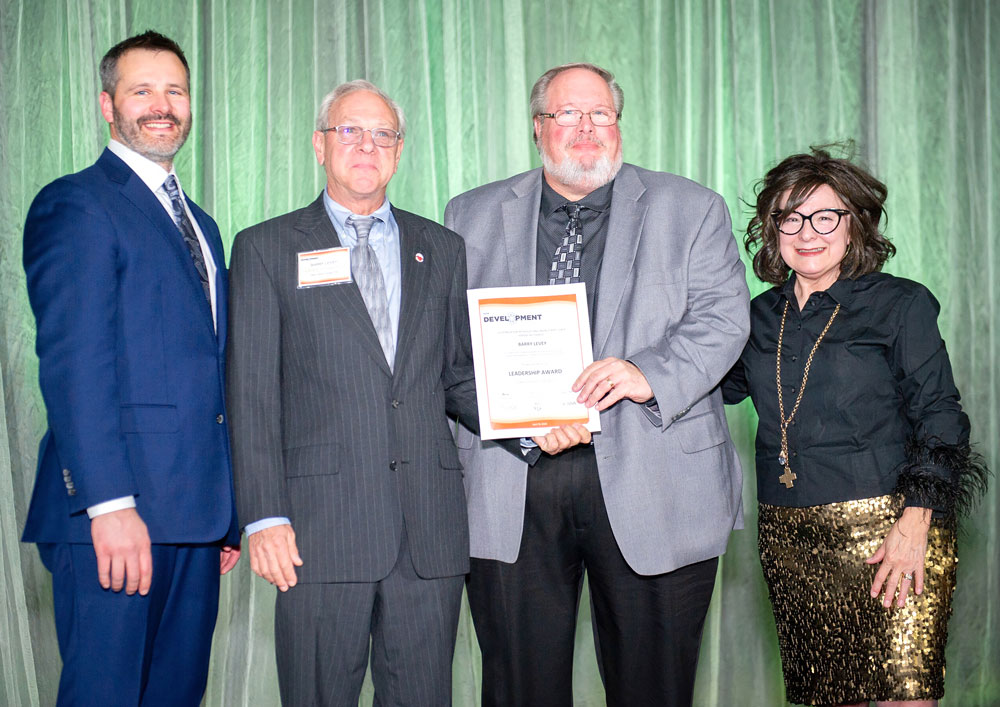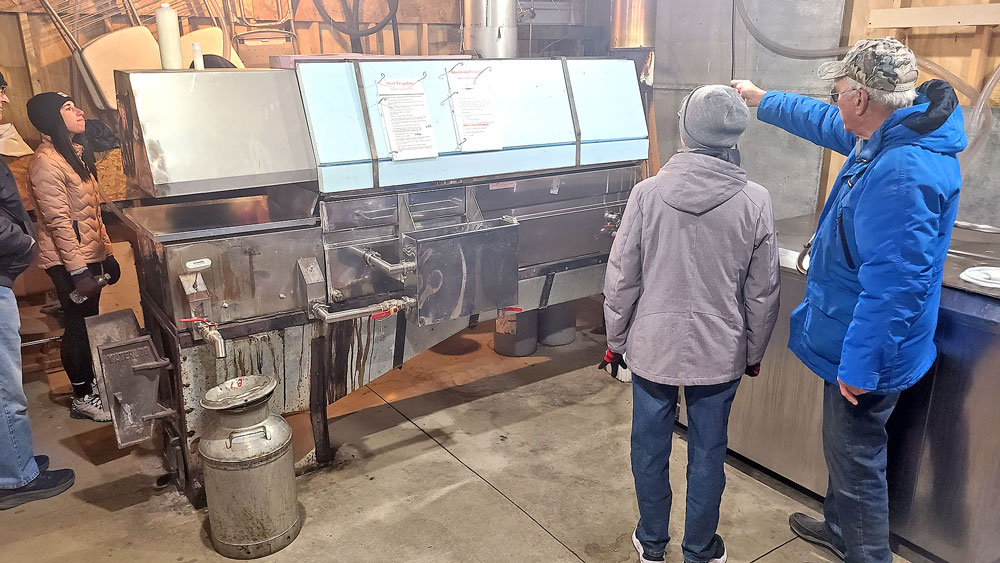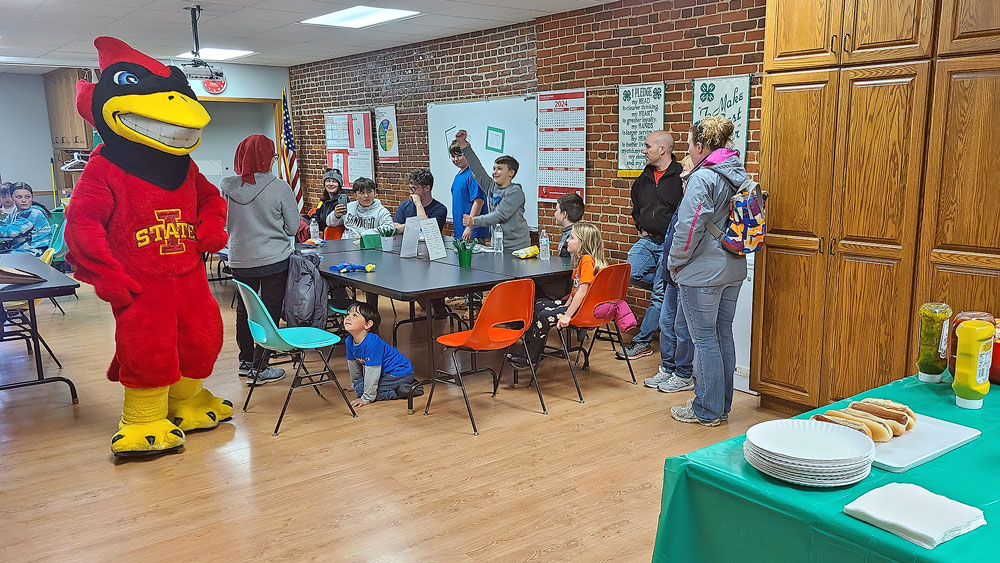Rancor of national politics left out of local and state candidate forum

By Chris Baldus | cbaldus@charlescitypress.com
A storm was raging — high and damaging winds, pitiless and piercing.
But inside New Life Church last Thursday, there was none of that. The cyclone of anger and division marring national elections seemed far away.
That was by design, according to the Rev. Michael Downey who helped organize the local candidate forum and played moderator, asking the candidates the pre-established questions drawn up by three local pastors.
Nine candidates attended, and the audience was sparcer than it might have been had not a heavy rainstorm pummeled the area that evening. When Sen. Mary Jo Wilhelm arrived, she took her seat with the other candidates and looked over the sopping paper that had been her notes but were now ink blots.
The Rev. Rod Rindahl between opening prayers announced where to go in the church for safety if the storm outside got worse. The lights blinked three times as he spoke.
The weather didn’t interrupt again as Downey asked all the candidates: 1. What are your top three priorities you’d like to see accomplished during the near term? and 2. What motivates you to offer your time and talents to serve the people?
Candidates for state office were asked a third question: Is religious freedom necessary for other freedoms to flourish?
Attending the forum were Floyd County supervisor candidates Linda Tjaden and incumbent Roy Schwickerath; Iowa House candidates Staci Stokes and incumbent Todd Prichard; Iowa Senate candidates Waylon Brown and incumbent Wilhelm; unopposed Floyd County Auditor Gloria Carr, and Floyd County sheriff candidates Chief Deputy Jeff Crooks and Charles City Police Officer William Vetter. The third candidate running for sheriff, Marc Lantz, did not attend.
Downing said all local candidates were invited.
Mental health
The state of mental health services in Iowa was among the top three priorities for the sheriff, Iowa House candidates and one of the Iowa Senate candidates.
The closure of state mental health facilities, lack of funding for local governments and agency to pick up the slack, shortage of “beds” to help people in emergency situation and a lack of personnel are some of the issues identified by advocates and service providers in the state.
Prichard, who mentioned mental health third while listing his top three priorities should he win re-election to the Iowa House, said one of his most disappointing days in the Legislature was when the Republican-led House didn’t “didn’t fully fund the mental health transition” from state to local services.
Prichard is a minority leader for the Democrats.
As a county prosecutor, he dealt with mental health commitments and said “You see the fight for survival that these people are in.”
A veteran himself who has served in four overseas deployments, Prichard added that too many veterans are lost to suicide.
His Republican challenger in House District 52, Stokes, said in her conversations with potential voters “mental health keeps coming up. We need to figure out something in that area.”
Stokes, an education consultant, said in her position, she learned a lot about different systems working well and others not working well. Leaders need to work together to implement those systems that are found to work, she said.
Wilhelm, a Democrat seeking re-election in District 26, said her third priority is improving mental health care in the state. Brown, her Republican opponent, did not mention mental health among his top three priorities.
The issue looms large for law enforcement.
Crooks also said mental health is a big issue in sheriff’s department, which deals with those types of issues every day. That can deprive the county of deputies serving in the county. Deputies put on more than 3,000 miles last year driving people in need of mental health services to other parts of the state, he said.
Vetter listed dealing with mental health trauma third in his priorities and noted that he attends a six-county task force in Mason City trying to deal with the issue.
Trauma of many sorts lead to mental health issues and if dealt with early by first responders such as police and deputies, it can head off later problems, such as illegal drug use, he said.
“Taking time to deal with it early is well worth our time,” he said.
Water Quality
Each of the state candidates put water quality in their top priorities.
“Everybody in this room (wants) to have good drinking water,” said Wilhelm, who added that her’s is a family that loves to fish. “(We) need to look at how to have a good plan and also how to pay for it and should have that discussion early in the (legislative) session.”
Brown listed water quality was his second priority.
“It is an issue we are going to have to address,” he said. “The Legislature does need to work to find a stable long-term funding source to fund (the nutrient reduction strategy.)”
Prichard said he’s “been a leading advocate of the water quality issue. It really is an issue that its time has come … It’s going to take leadership from the governor, the legislature and the stakeholders.”
Clean water indicates a good land use policy, he said.
Education
Wilhelm and Brown share common ground regarding education, both saying they want adequate funding for schools to help students successfully enter the Iowa workforce.
Wilhelm said it’s important to have “timely” and “adequate” funding of public education and related that rural school districts have closed or are talking about closing schools because of budget issues.
“(I) want to keep … elementary class sizes low so they get the education they need,” she said.
Post-secondary education does not need to be a four-year-college and she touted community colleges and learning trades.
“When an Iowa student goes to an community college, 80 percent stay in Iowa,” she said.
Brown said education is his first priority. He wants to “ work with teachers and school districts to make sure they have resources they need to provide students with a great education” so when they enter workforce they will be successful.
Prichard said his priorities are still education, environment and economy, just as they were when he first ran for his House seat.
“Education funding is so key especially in rural areas,” he said, calling schools the bedrock of communities.
Schools are economic drivers, he said. A good school system will attract families, he said.
Fiscal responsibility and economic development
Schwickerath, a Democrat, listed fiscal responsibility first among his priorities should he be re-elected to the Floyd County Board.
“One thing that I want to make sure to continue is to be fiscally responsible,” he said. “I think it’s very important … People want to make sure we are spending their money wisely.”
A second priority is economic development for the county, which involves quality of life improvements.
“We have to pick the right things to invest in and support,” he said. “We supported the Youth Activities Center at fairgrounds … the aquatics center in Nora Springs. … It’s how we keep and attract people.”
“We keep talking about bike trails — we’ve had two deaths — if we can do something to make safer bike trails that would be excellent,” he said.
Tjaden, his Republican challenger, introduced herself explaining she has been involved in “several” businesses and career paths and she puts collaboration between county, city and school governments as a top priority and many counties that don’t collaborate “seem to be falling apart.”
“A lot of the work being done right now, it is a study at this point” and she would be fiscally responsible going forward and would “ avoid paralysis by analysis.”
Her third priority is making certain the county retains and attracts people back.
“Give them something that makes them want to come back,” She said.
Floyd County Jail
Schwickerath listed as his third priority staying on top of the jail and law enforcement center project.
He led the committee that began looking into the project. He has routinely said a project of this magnitude takes time to do it right.
“I’m hoping in the next four years we will have definite direction if not started already,” he said.
Consolidating government functions in fewer buildings will be less expensive in the future, including the cost of security.
In the sheriff’s race, Crooks said it’s important to keep moving forward with the law enforcement center project, with one reason being the state of the more than 70-year-old county jail. It’s a “very good jail staff keeping that running.”
While a new jail would be “great” he said, more details need to be considered such as sharing a facility with another county or taking inmates to another county’s jail.
Other sheriff priorities
Crooks said making the Highway 218 interchange at Floyd safer is important. The state has lowered the speed limit going into the intersection but that is just a small step in what needs to happen, he said.
“We are looking for an overpass in Floyd and that is a big thing that needs to be addressed,” he said.
Vetter puts much stock in building interaction between communities and the sheriff’s office. Being approachable, which is more than an “open door” policy, working with Neighborhood Watch programs, and letting people know law enforcement is listening, are all important, he said.
“A lot of times citizens give information and don’t feel we act enough on call,” he said.
It’s important to let people know they’re helping.
“I get involved in the community in the schools so they come talk to me,” he said.
He is visible in the community, and “The deputies need to be in a community” too he said. They can still take calls when at a community festival, he said.
A second priority is making certain emergency agencies throughout the area are working collaboratively so when the time comes to deal with a disaster, it’s second nature to work together. Training together helps with this, he said.
Other priorities
Brown listed as his third priority eliminating red tape that hurts small business.
“I don’t believe the solution is more government,” he said, adding that hardworking businesses, families and the future generation will have the solutions.
Auditor Gloria Carr, who has been in office since 2004, is running unopposed this fall. She talked about the improvements made in the Auditor’s Office, courthouse and overall county government. The county updated its website to better reach out to the public and the Auditor’s Office also started a Facebook page.
The county has also updated its voting equipment, replaced the courthouse camera and door system, and installed a new phone system that connects county government efficiently with other government buildings and entities, such as public health.
The County also now has an upper watershed management, she said.
Upkeep of the courthouse falls to her office, she said, and she is looking ahead. They are working on a fire alarm replacement program and “I’d love to see (a) window replacement project,” she said, adding they are looking for grants.
Of the courthouse, she said it’s a sturdy old building.
“If we were in that building tonight I would not be worried,” referring to the stormy weather of the night.
She would like to add electronic poll books to the county’s election equipment.
Why serve
Answers were similar across the board when it came to the question: “What motivates you to offer your time and talents to serve the people?”
Vetter, a retired U.S. Marine, said “I truly want to be part of the solution” and he wants to leave the community better than he found it for the next generations
He joins efforts he is passionate about, he said. Examples include collecting donations for Toys for Tots or serving on the Child Abuse Prevention Committee.
Being a community servant is what he has been doing all his life, and is what he will do the rest of his life, he said.
“It’s what we do,” he said.
Crooks, who entered law enforcement after a teaching career, said he gets great satisfaction from helping others. Deputies do their best to find solutions for the people they are called to help.
“It’s very gratifying also,” he said. “Also, we have a lot of pride and honor in our occupation.”
“What motivates me in my job as a deputy sheriff is the satisfaction we get from helping people. It’s like Bill said, you’re going to hear that down the line here. That’s what we do.”
Tjaden said that she has lived here for 35 years and she and her husband raised their kids here. They graduated from Charles City schools.
They farm outside of town and she provided a second income as is needed by farm families, she said. It took her away from home for long stretches for 18 years, she said, but it taught her about business. She has managed large and lots of budgets, she said.
She is a hard worker and “I know I can do it,” she said.
Schwickerath worked in hospital maintenance before he was a firefighter who spent 32 years in the Charles City Fire Department. The last 14 he was the chief.
“I was always a leader,” he said, and upon his retirement he decided to run for County Board to continue to serve as a leader.
“The beauty is I am at retired and I can devote all my time to supervisor,” he said.
He said he’s learned much in his 3 1/2 years on the board and wants to use that to continue serving.
“I am a taxpayer like all of you,” he also said. “I care about where my money goes.”
Brown, noting that his roots run five generations deep in north Iowa said, “Family is my biggest motivation … I am grateful for all sacrifice made for me from generations before.”
It’s his turn to help the next generations be successful, he said.
“What motivates me? Everybody around me,” he said.
Wilhelm, told of her background as an emergency medical technician and medical clinic employee. She chose her professions because she wanted to be helpful. It’s still at her core and she likes hearing from her constituents, telling her what their needs are and how she can help.
Most of the bills she has sponsored had come from constituents talking with her, she said.
Stokes said her faith plays a major role in her life.
“I am a Christian and I have a personal faith in Jesus Christ and he has certainly led me,” she said.
He led her to do mission trips, and make career choices she said.
“I have a heart to serve and to lift people up,” she said. “It is one of my strengths.”
Prichard was asked this after he won election to the House the first time, he said and his immediate reaction at that time was “I have no idea,” he said.
It’s the values you’re raised with, he said. His parents were community minded. His father was active in politics. And Charles City is influential, he said.
“This is a community that serves,” he said. “There are people here in the audience that I recognize that we have worked on projects.”
He wants to be part of that service community, he said.
Any victory in the Legislature is hard fought, he said, but getting movement or helping someone is rewarding.
“I can’t think of anything more rewarding,” he said.
“The job is about more than voting, It’s about phone calls throughout the day and crises that you can help.”
Gloria Carr said her motivation is the people and that she is “a workaholic, and I think I’m a good problem solver and everyday is a challenge.”
Faith question
Candidates for state office were asked a third question: Is religious freedom necessary for other freedoms to flourish?
Wilhelm said: “Religion freedom is a constitutionally protected right” and it’s “amazing what our forefathers thought of.”
Brown said religious freedom is crucial. “Our fore founders they were just so forward thinking,” he said. “I believe our country was founded on this … Yes I do believe it’s very important.”
Prichard said, “There is a reason the First Amendment is the first amendment.”
Early settlers left England to escape persecution by the country’s church. They “didn’t want to be told by their government how to think,” he said.
Having been in other countries that try to control thought and religion, he said, “You really appreciate what we have here.”
“If you don’t think it’s important, think about if we didn’t have it,” he said.
Stokes agreed with the premise of the question and said religion freedom is necessary, and “I’m a teacher, so I brought something.”
She held up a lynchpin to make the point that religious freedom is a lynchpin for freedom.
“If I can’t act out my faith and what I believe, the rest is nothing,” she said.
-20160919-









Social Share